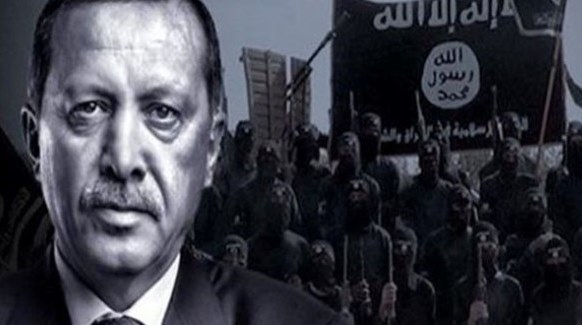Exclusive: Turkish President Erdogan’s push toward nationalistic authoritarianism has an important ally in the political arm of the neo-fascist Grey Wolves, reports Jonathan Marshall.
By Jonathan Marshall
All but one of Turkey’s major opposition parties denounced Sunday’s referendum to create an authoritarian new presidential system as marred by fraud and as a threat to the country’s political freedoms. The exception was the Nationalist Movement Party (MHP), founded in 1969 to promote a neo-fascist, ultranationalist program. Its fortunes bear close watching as a clue to Turkey’s political direction.
The MHP and its paramilitary wing, the Grey Wolves, were among the leaders of Turkey’s death squad violence against leftist intellectuals, academics, and Kurdish activists in the 1970s and 1980s. In return, right-wing state security forces protected their organized criminal operations, including drug trafficking. One associate of the Grey Wolves, Mehmet Ali Agca, was convicted of trying to assassinate Pope John Paul II in 1981.
A New York Times reporter at that time described the MHP’s followers as a “xenophobic, fanatically nationalist, neofascist network steeped in violence.” The party’s U.S.-trained leader helped execute a successful military coup in 1960, and by 1980 was implicated in smuggling heroin into Western Europe.
Turkish Prime Minster (now President) Recep Tayyip Erdogan broke the back of that “deep state” alliance of secret intelligence, criminal, and right-wing forces through mass purges and indictments in 2008. Last year, however, he made up with many of these former opponents, making them allies of his own increasingly authoritarian government and his military adventures in Syria and Iraq.
One winner in that realignment was the MHP. Like the National Front in France, the MHP has shed many of its extremist positions in recent years to join the mainstream of respectable politics in Turkey.
Still, its racist roots were exposed to full public view in 2015, when Grey Wolves members attacked a South Korean tourist in Istanbul and hung banners saying “We crave Chinese blood” to protest Beijing’s crackdown on Turkic separatists. The MHP’s leader, Devlet Bahceli, defended his street supporters, saying “how are you going to differentiate between Korean and Chinese? They both have slanted eyes. Does it really matter?”
As an advocate of ethnic Turkish supremacy, moreover, the MHP remains violently opposed to making any concessions to Kurdish separatists, and denounced Erdogan for starting peace talks with them in 2013.
Allies Against the Kurds
Two years later, Erdogan reversed course and began waging total war against the Kurds, both at home and in Syria. That set the stage for a tacit alliance between his ruling party, the AKP, and the MHP.
Grey Wolves thugs attacked offices of the opposition Peoples’ Democratic Party, which supports the rights of Kurds and other political minorities. Senior MHP officials, along with members of their youth organization, also joined the fighting in Syria to support ethnic Turks against the Assad government and Syrian Kurds. Remarked one Turkish journalist, “The ultranationalists are the most fertile pool for secret operations.”
Even with his opponents cowering or imprisoned under a state of emergency declared after a failed military coup last year, Erdogan needed the MHP, which holds 36 seats in the 550-member parliament, to win approval of the constitutional amendments at issue in Sunday’s referendum. MHP officials reportedly hope to earn seats in the president’s new cabinet.
MHP leader Bahceli hailed Sunday’s vote to grant President Erdogan immense new powers as “a very significant achievement” and the “final word” for the future of “the great Turkish nation.” The head of the Grey Wolves vowed that his followers would “take up our arms and fight if necessary” to defend the outcome.
Fighting may indeed become inevitable if opponents, backed by foreign election observers, continue to contest the referendum vote.
“Even if they are demoralized in their defeat, Erdogan’s project will arouse significant resistance among the various ‘No’ camps,” comments Steven Cook, a Mideast expert at the Council on Foreign Relations. “The predictable result will be the continuation of the purge that has been going on since even before last July’s failed coup including more arrests and the additional delegitimization of Erdogan’s parliamentary opposition. All of this will further destabilize Turkish politics.”
It remains to be seen how the Trump administration will deal with Turkey’s increasingly authoritarian regime and aggressive foreign policy. President Trump’s first national security adviser, retired Lt. Gen. Michael Flynn, took more than half a million dollars from a pro-Erdogan Turkish businessman to promote Ankara’s interests. Flynn was also joined by House Intelligence Committee Chairman Devin Nunes for a private meeting at Trump Hotel in Washington with Foreign Minister Mevlüt Çavu?o?lu on Jan. 18.
More important than secret lobbying activity, however, is the strategic importance of U.S. access to Incirlik Air Base in Turkey, from which U.S. warplanes launch attacks in Syria. The base also houses some 50 hydrogen bombs for NATO, giving Washington all the more reason to stay friendly with the Turkish government.
But if Erdogan and his new allies among Turkey’s ultranationalist right continue to make new enemies at home and abroad, the Trump administration will need to rethink the viability of continuing to rely on Ankara to make possible continued military intervention in the Middle East.
Jonathan Marshall is author of “Turkey’s Revival of a Dirty ‘Deep State’”, “Turkey’s Nukes: A Sum of All Fears,” and “Coups Inside NATO: A Disturbing History.”
Source : https://consortiumnews.com/2017/04/19/erdogans-neo-fascist-turkish-allies/

